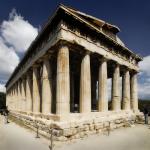|
This section contains 1,113 words (approx. 4 pages at 300 words per page) |

|
Food Supply. During the Classical Period (480-323 B.C.E.), the city-states were primarily centers of consumption, and the first task of their governments was to provide their people with the commodities essential for survival, imported grain being the most important of them. Athens was not the only state in need of foreign grain; several other states in Greece proper and in Ionia also had to rely on regular imports. Insofar as the city-states could be said to have had an economic policy, that policy consisted in ensuring the supply of food and finding the means to pay for it. The solution of these two problems overrode all other economic concerns; in effect, a state's economic policy was, in reality, based upon imports, and its financial goals consisted in little more than the raising of taxes.
Exports. Because...
|
This section contains 1,113 words (approx. 4 pages at 300 words per page) |

|




